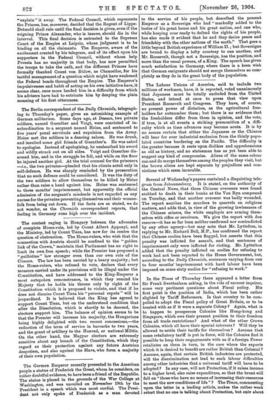The contest raging in Hungary between the advocates of complete
Home-rule, led by Count Albert Apponyi, and the Ministry, led by Count Tisza, has now for its centre the question of obstruction. The Home-rulers, who wish that the connection with Austria should be confined to the " golden link of the Crown," maintain that Parliament has no right to limit its own free speech ; while the Premier has proposed a " guillotine " law stronger even than our own rule of the Closure. The law has been carried by a heavy majority ; but the Home-rulers, who refused to vote, declare that every measure carried under its provisions will be illegal under the Constitution, and have addressed to the King-Emperor a most outspoken remonstrance, in which they remind his Majesty that he holds his throne only by right of the Constitution which it is proposed to violate, and that if he does not dismiss Count Tisza his " personal repute " will be jeopardised. It is believed that the King has agreed to support Count Tisza, but on the understood condition that after the Dissolution, which is shortly to be decreed, the electors support him. The balance of opinion seems to be that the Premier will increase his majority, the Hungarians being highly delighted with two recent concessions,—the reduction of the term of service in barracks to two years, and the grant of artillery to the Honved, or national Militia. On the other hand, the Magyar electors are extremely sensitive about any breach of the Constitution, which they regard as their protection against any future Austrian despotism, and also against the Slays, who form a majority of their own population.














































 Previous page
Previous page